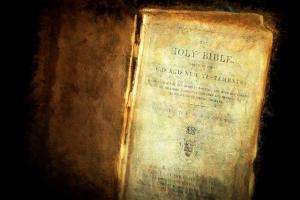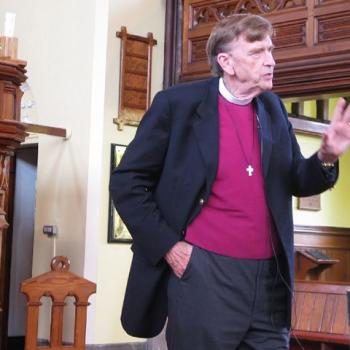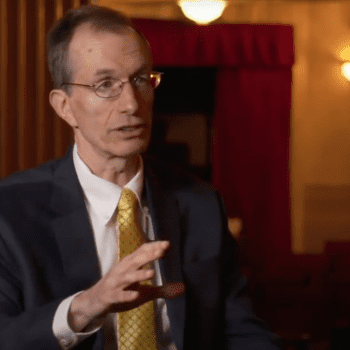 All things considered—but perhaps uncharacteristically for a Protestant—my theological interests have always tended more towards the historical and systematic than to the strictly exegetical. Philosophically speaking, over the years I’ve drunk deeply at the well of Alasdair MacIntyre, Paul Ricoeur, Brevard Childs, and those others who have insisted upon the fact that interpretation always occurs within a communal context committed to certain bedrock assumptions. That is to say, there’s no pre-theological “view from nowhere” or “objective” vantage point from which one approaches the Bible. For better or worse, just as one cannot hope to be pristinely neutral about the family into which they are born, one cannot hope to suspend all judgment about the Word into which they are baptized and catechized.
All things considered—but perhaps uncharacteristically for a Protestant—my theological interests have always tended more towards the historical and systematic than to the strictly exegetical. Philosophically speaking, over the years I’ve drunk deeply at the well of Alasdair MacIntyre, Paul Ricoeur, Brevard Childs, and those others who have insisted upon the fact that interpretation always occurs within a communal context committed to certain bedrock assumptions. That is to say, there’s no pre-theological “view from nowhere” or “objective” vantage point from which one approaches the Bible. For better or worse, just as one cannot hope to be pristinely neutral about the family into which they are born, one cannot hope to suspend all judgment about the Word into which they are baptized and catechized.
As a result, I find it difficult to get particularly exercised about the authorship of Isaiah, Markan priority, the historical provenance of Revelation, or many of the other questions that absorb mainline biblical scholars. Rather, I’m increasingly convinced that the fundamental presupposition of Christian thought on the subject ought to be a belief in the overarching unity of the text—the conviction that through the Scriptures we have, God has in fact spoken in a historically unique and particular way. From that standpoint, the urgent question is not, for example, when exactly the Pentateuch can be dated; instead, it is about what God Himself seeks to communicate through the text.
None of this, of course, is to diminish the importance of biblical study as such—it’s simply to observe that we ought not read the Word in purported isolation (a move that tends to allow our own personal proclivities to sneak in the back door), but rather work to understand the text alongside the Church past and present. (To that end, I’ve recently begun acquiring volumes in the excellent Brazos Theological Commentary on the Bible series, which is structured around this methodological insight.)
In the course of these reflections, one thinker whom I’ve found particularly enlightening is Reformed theologian Peter Leithart, president of the Theopolis Institute in Birmingham and longtime proponent of a new “reformed catholicity” integrating insights from the Catholic, Orthodox, and Protestant traditions alike. A number of Leithart’s views are undoubtedly idiosyncratic—most notably his strong support for paedocommunion, or the administration of the Eucharist to children—but even where I disagree with him, I’ve found him to be an original and stimulating writer. (An infrequently mentioned fact about Leithart is the fact that his doctoral advisor was Anglo-Catholic theologian John Milbank, founder of the Radical Orthodoxy movement; though to my knowledge their writings don’t really engage with each other’s, they have rather similar theological instincts. More on that another time.)
Most notably, Leithart is a longtime proponent of typological interpretation of Scripture—a method that, while not denying the actual historicity of the events described, sees in the structure of the Bible a layering of patterns upon patterns, symbols pointing forward and backward in time to form a cohesive tapestry of meaning. A simple application of the method might look like this: just as Eve prefigures Sarah, Sarah prefigures Mary; just as Adam prefigures Moses; Moses prefigures Christ. In the first case, the analogy is one of obedience to God and the giving of life; in the second case, the analogy turns on the prophetic and priestly roles of the individuals described. Note that this interpretive approach is a natural outgrowth of a deep belief in the Bible’s unity. Apart from that commitment, typological interpretation doesn’t really work: the parallels between biblical images and themes are reduced to matters of conscious imitation (rather like literary homage or, well, fan-fiction) or sheer coincidence.
That said, what I do find rather baffling about Leithart’s theological project as a whole is his sharp rejection of “Hellenizing” approaches to the Christian tradition or to the metaphysical foundations of theology more broadly (a point remarked upon by the ever-interesting Steven Wedgeworth in a lengthy analysis). By contrast, as I see it, there is a fundamental consonance between the typological method Leithart deploys so skillfully and the Hellenistic philosophical approach.
In lieu of a scientistic metanarrative that would reduce the “real” to mere particles in motion, with human stories and faiths superimposed atop an indifferent material substrate, Leithart consistently calls his readers to invert their thinking: the world as described by the Word is reality properly characterized, with the narrative of modern “disenchantment” a thin and historically contingent veneer atop its surface. In his words, “Scripture trains our senses to have contact with the world as it truly is”—awakening the Christian to the knowledge of the cosmos as “a stable or collapsing house, a glorious or a ruined temple.” This truth, of course, is eternal.
To speak of Christ as Logos, as the Apostle John so famously does, is to acknowledge the fact of this very eternal framework, a universal rational order that is at once both cosmic and personal. If it is indeed through the Son that all things were made, as the Gospels teach, then the work of Christ must be understood to encompass the weaving of the ordered pattern of reality itself. To do theology and philosophy as a Christian, in short, is to acknowledge a transcendent order in which finite and mutable things participate.
And yet this is precisely the heart of Hellenistic (more specifically, Platonic) philosophical theology, and when it is lost, so too is the philosophical grammar that informs Leithart’s whole project. As Michael Hanby writes, “de-Hellenization means the eclipse of an order of being, nature, and truth that transcends history, the triumph of time over eternity, with the corresponding reduction of nature to meaningless matter and a reduction of truth to so many social, political, or psychological ‘situations.’”
Fortunately, there’s no need to make that move. Speaking as someone whose philosophical instincts run in a decidedly Platonic direction, this metaphysical backdrop allows me to discern in Leithart’s writings a richness and depth that, perhaps, he himself would not even countenance. If systematic theology must always be evaluated against biblical theology, perhaps from a certain point of view the reverse is also true: faith and reason, in the end, ought to go hand-in-hand.












